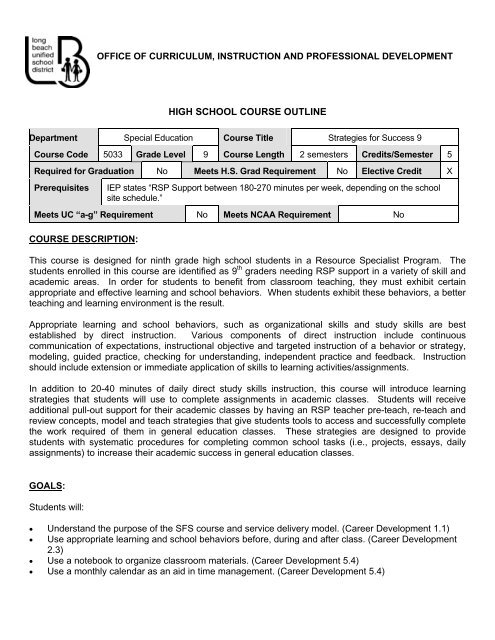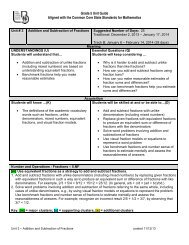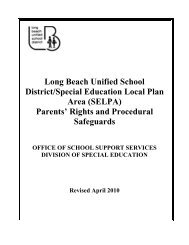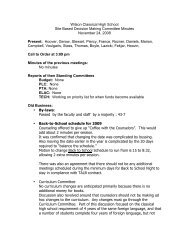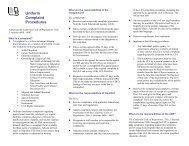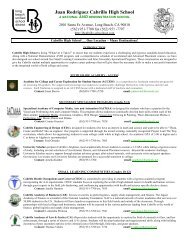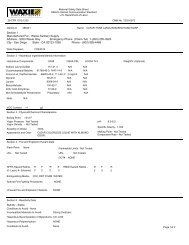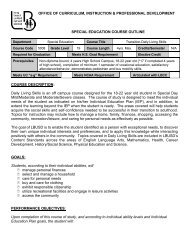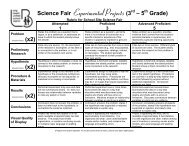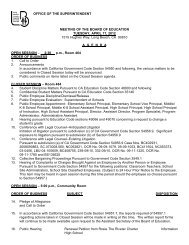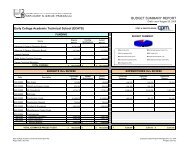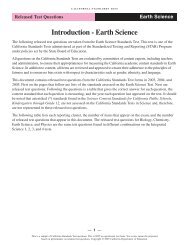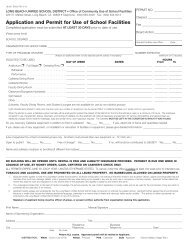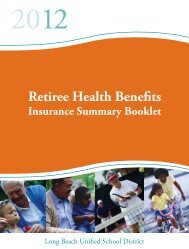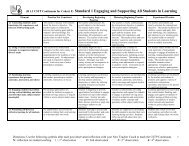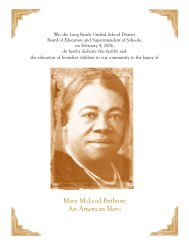high school course outline - Long Beach Unified School District
high school course outline - Long Beach Unified School District
high school course outline - Long Beach Unified School District
Create successful ePaper yourself
Turn your PDF publications into a flip-book with our unique Google optimized e-Paper software.
Strategies for Success 9<br />
Page 1<br />
OFFICE OF CURRICULUM, INSTRUCTION AND PROFESSIONAL DEVELOPMENT<br />
HIGH SCHOOL COURSE OUTLINE<br />
Department Special Education Course Title Strategies for Success 9<br />
Course Code 5033 Grade Level 9 Course Length 2 semesters Credits/Semester 5<br />
Required for Graduation No Meets H.S. Grad Requirement No Elective Credit X<br />
Prerequisites<br />
IEP states “RSP Support between 180-270 minutes per week, depending on the <strong>school</strong><br />
site schedule.”<br />
Meets UC “a-g” Requirement No Meets NCAA Requirement No<br />
COURSE DESCRIPTION:<br />
This <strong>course</strong> is designed for ninth grade <strong>high</strong> <strong>school</strong> students in a Resource Specialist Program. The<br />
students enrolled in this <strong>course</strong> are identified as 9 th graders needing RSP support in a variety of skill and<br />
academic areas. In order for students to benefit from classroom teaching, they must exhibit certain<br />
appropriate and effective learning and <strong>school</strong> behaviors. When students exhibit these behaviors, a better<br />
teaching and learning environment is the result.<br />
Appropriate learning and <strong>school</strong> behaviors, such as organizational skills and study skills are best<br />
established by direct instruction. Various components of direct instruction include continuous<br />
communication of expectations, instructional objective and targeted instruction of a behavior or strategy,<br />
modeling, guided practice, checking for understanding, independent practice and feedback. Instruction<br />
should include extension or immediate application of skills to learning activities/assignments.<br />
In addition to 20-40 minutes of daily direct study skills instruction, this <strong>course</strong> will introduce learning<br />
strategies that students will use to complete assignments in academic classes. Students will receive<br />
additional pull-out support for their academic classes by having an RSP teacher pre-teach, re-teach and<br />
review concepts, model and teach strategies that give students tools to access and successfully complete<br />
the work required of them in general education classes. These strategies are designed to provide<br />
students with systematic procedures for completing common <strong>school</strong> tasks (i.e., projects, essays, daily<br />
assignments) to increase their academic success in general education classes.<br />
GOALS:<br />
Students will:<br />
• Understand the purpose of the SFS <strong>course</strong> and service delivery model. (Career Development 1.1)<br />
• Use appropriate learning and <strong>school</strong> behaviors before, during and after class. (Career Development<br />
2.3)<br />
• Use a notebook to organize classroom materials. (Career Development 5.4)<br />
• Use a monthly calendar as an aid in time management. (Career Development 5.4)
Strategies for Success 9<br />
Page 2<br />
• Organize assignments and papers. (ELA 2.1)<br />
• Create an efficient and effective study environment. (Career Development 5.5)<br />
• Plan assignments effectively.<br />
• Develop an understanding of the <strong>high</strong> <strong>school</strong> requirements, policies and resource<br />
• Develop an action plan in their planner for completing required community service.<br />
• Learn about their own IEPs<br />
• Plan for transition plans<br />
• Self-advocate for themselves (i.e., IEPs, homework, absences, clarity)<br />
• Answer written questions on quizzes, tests and in various text.<br />
• Apply proofreading strategies. (ELA 1.4 Written Conventions)<br />
• Use memory devices to remember and learn material.<br />
• Use active reading strategies.<br />
• Map written materials.<br />
• Summarize information. (ELA- Writing Applications)<br />
• Develop oral and written language abilities. (ELA- Written and Oral English Language Conventions)<br />
• Develop strategies for brainstorming.<br />
• Learn strategies for effectively participating in class discussions.<br />
• Use various content area strategies to access textbooks.<br />
• Monitor their own progress.<br />
• Set goals and develop individual action plans to facilitate success.<br />
• Know their campus and where to locate student services available to them.<br />
• Use technology to support their learning.<br />
PERFORMANCE STANDARDS:<br />
Students will:<br />
Unit 1:<br />
Getting Started<br />
1. Review and verify current class schedule and make changes as necessary based on RSP teacher<br />
direction.<br />
2. Describe the purpose of the <strong>course</strong>.<br />
3. Ensure that they obtain necessary materials for all <strong>course</strong>s.<br />
4. Familiarize themselves with various areas of the campus.<br />
5. Develop and use a classroom word wall with “Strategies for Success” vocabulary.<br />
6. Turn in completed core content area bi-weekly progress reports every two weeks.<br />
Unit 2:<br />
<strong>School</strong> Behaviors and Classroom Expectations<br />
7. Be ready to begin class when the bell rings.<br />
8. Follow “during class” guidelines for each academic <strong>course</strong> enrolled.<br />
9. Explain specific learning and <strong>school</strong> behaviors that are important to implement before, during, and<br />
after class.<br />
10. Discuss appropriate ways to ask for help both inside and outside of the classroom.<br />
11. Discuss appropriate ways to resolve conflicts both inside and outside the classroom involving both<br />
peers and adults.<br />
12. Attend all classes and ensure that notes for excused absences are turned in to the attendance<br />
office in a timely manner.<br />
13. Record awarded daily SFS points
Strategies for Success 9<br />
Page 3<br />
Unit 3:<br />
Organizational Skills/Notebook<br />
14. Maintain a three-ring binder, with dividers and a pen/pencil pouch<br />
15. Maintain individual binders for Math, Science, history and English and other subject areas.<br />
16. Record all assignments (short and long-term), tests, reports, and special events into their<br />
planner/calendar.<br />
17. Plan daily home study in their planner.<br />
18. Keep a learning log of all skills learned in SFS and academic classes.<br />
Unit 4:<br />
Getting the Most Out of High <strong>School</strong><br />
19. Identify all graduation requirements.<br />
20. Describe service learning options and requirement<br />
21. Create an action plan to complete service learning requirements (e.g., completion of 10 hours each<br />
grade level).<br />
22. State whom their grade level counselor is and where the counselor is located.<br />
23. Explain a G.P.A.<br />
24. Explain the purpose of a transcript, including what it is, what is put on them, where they go etc.<br />
25. Explain the LBUSD Graduation Check<br />
26. Identify site policies (i.e., attendance, dress code etc. and the consequences for violation of such<br />
site policies)<br />
27. Identify what constitutes academic dishonesty and consequences for it.<br />
28. Identify clubs, organizations and sports available at the specific site.<br />
29. Identify electives available both on and off campus.<br />
30. Identify site specific ways to receive additional support in academics (i.e.,unscheduled period,<br />
lunch and after-<strong>school</strong> tutoring)<br />
31. Evaluate semester status of graduation check.<br />
32. Explain the NCAA requirements for participation in college sports(for student athletes).<br />
33. Explain where the Career Center is located on campus and what services they offer.<br />
34. Demonstrate how to read a rubric and discuss grading for each <strong>course</strong> enrolled.<br />
Unit 5:<br />
Know Your IEP<br />
35 Explain what an IEP is<br />
36 Convey when their IEP is due.<br />
37 Identify who should be present at their IEP.<br />
38 Explain the accommodations needed on assessments.<br />
39 Explain the accommodations needed in classroom instruction.<br />
40 Communicate required accommodations to general education teacher<br />
41 Describe current levels of performance.<br />
42 Advocate for use of their IEP accommodations<br />
43 Identify and explain their goals and objectives<br />
44 Communicate and advocate for implementation of behavior plan, if applicable.<br />
45 Provide input on their needs, goals and other information during the IEP.<br />
Unit 6:<br />
Building a Community of Learners<br />
46 Generate topic specific ideas with a partner and small groups.<br />
47 Use and evaluate their own appropriate cooperative behaviors with partners and small groups.<br />
48 Facilitate academic discussions with a question wall.<br />
49 Develop a classroom oath.
Strategies for Success 9<br />
Page 4<br />
Unit 7:<br />
Self-Advocacy<br />
50 Approach the general education teacher at the appropriate time to request completion of the biweekly<br />
grade report via form or e-mail<br />
51 Obtain SFS general education teacher report every other week and return to SFS teacher.<br />
52 Communicate and advocate for implementation of behavior plan, if applicable.<br />
53 Advocate for use of their IEP accommodations<br />
54 Provide input on their needs, goals and other information during the IEP.<br />
Unit 8:<br />
Goal Setting<br />
55 Determine individual short-term goals to be achieved based on data collected.<br />
56 Determine an individual long-term goal to be achieved based on data collected<br />
57 Determine an action plan to help guide them to their goal.<br />
58 Measure progress towards goals.<br />
Unit 9:<br />
Data Collection<br />
59 Explain the importance of data to inform academic progress.<br />
60 Determine what data to collect and how it will be measured.<br />
61 Collect baseline data.<br />
62 Collect data bi-weekly.<br />
63 Keep a GPA graph on each biweekly grade check.<br />
64 Use and compare data for academic improvement.<br />
Unit 10:<br />
Note-Taking/Listening<br />
65 Determine and record topics, important details, and diagrams presented in instruction.<br />
66 Reread and revise notes to ensure understanding.<br />
67 Write and use study questions based on their notes.<br />
68 Repeat directions to teacher or peers.<br />
69 Separate the steps required to complete a direction.<br />
70 Use various graphic organizers to take notes on verbal directions.<br />
71 Increase ability to follow complex and multiple step oral directions or information.<br />
72 Recite key information (such as numbers, dates, verbs, directions etc.)<br />
73 Recite and apply the steps of active listening.<br />
74 Use active listening skills.<br />
Unit 11:<br />
Test-Taking/Test Preparation<br />
75. Use the RCRC (Read, Cover, Recite, Check) strategy to learn new material.<br />
76. Create and use mnemonic devises to facilitate learning topics and related facts.<br />
77. Create an appropriate tool for studying based on the test/subject (i.e., question/answer, flashcards,<br />
formulas)<br />
78. Create test questions and discuss which questions occur the most (ie., author's purpose,<br />
vocabulary, main idea).<br />
79. Eliminate answers on a multiple choice test.<br />
80. Read a writing prompt and address all aspects of that prompt.
Strategies for Success 9<br />
Page 5<br />
Unit 12:<br />
Planning Assignments<br />
81. Divide longer assignments into smaller tasks.<br />
82. Write an action list for assistance in home studying.<br />
83. Set/reset priorities as new assignments are assigned.<br />
84. Select or create an appropriate time and place for home study with all essential materials.<br />
85. Describe procedures for completing homework.<br />
86. Complete neat, well-organized, legible papers.<br />
87. Use the four steps (plan it, complete it, check it, and turn it in) in planning for simple and complex<br />
assignments.<br />
Unit 13:<br />
Completing Assignments<br />
88. Write accurate, complete-sentence answers that restate the question.<br />
89. Write complete sentence answers to an assignment.<br />
90. Verify that all parts of the assignment are addressed and completed before turning in.<br />
91. Ask questions if unsure how to complete an assignment, due date, etc.<br />
92. Complete assignments before or on the due date.<br />
93. Track (check off) completed assignment in planner or an assignment log.<br />
94. Explain procedures for turning in completed work for each class.<br />
Unit 14:<br />
Student Engagement<br />
95. Respond with Sentence Starters.<br />
96. Explain and participate in the IDEA WAVE.<br />
97. Explain and participate in various engagement activities (response boards, give and take etc.)<br />
98. Initiate and/or participate in engagement activities during all instructional periods.<br />
99. Generate topic specific ideas with a partner and small groups.<br />
100. Use and evaluate their own appropriate cooperative behaviors with partners and small groups.<br />
101. Prepare for and participate in discussion.<br />
102. Understand, use, and generate examples of the steps in participating in discussions (i.e., Build<br />
Background, Knowledge/Schema, Think, Tell, Record, Share.).<br />
Unit 15:<br />
Accessing Textbooks<br />
103. Determine the organization and content of a text selection .<br />
104. Select a topic and important details of a paragraph.<br />
105. Take notes on a chapter.<br />
106. Retell chapter content from their notes.<br />
107. Write study questions that correspond with the content of their notes.<br />
108. Map topic and important details of a paragraph, headings, subheadings, and section of a chapter.<br />
109. Write a summary paragraph of important information.<br />
110. Use SOAPS to summarize a fictional passage read (SOAPS--subject, occasion, audience,<br />
purpose, and speaker).<br />
111. Use vocabulary strategies.<br />
112. Engage in text by using an anticipation guide.<br />
113. Use pre-reading strategies such as reading headings, subheadings, graphs, charts, diagrams, looking<br />
at context clues, margin notes, italics, bold print etc.
Strategies for Success 9<br />
Page 6<br />
Unit 16:<br />
Research Skills<br />
114. Use email to clarify questions and to communicate with their General Education Teachers.<br />
115. Identify research skills and people and places to find research.<br />
116. Identify the parts of speech, read the definition(s), example sentences and identify other forms of<br />
the entry word from a dictionary and answer questions about the meaning of the entry word<br />
117. Select the best definition from a word entry in a dictionary<br />
118. Use the World Wide Web to locate places, animals, events, and record specific information about<br />
those.<br />
Unit 17:<br />
Unit 18:<br />
Comprehension (used as a resource)<br />
Study Plans<br />
119. Analyze current home study<br />
120. Create a home study plan<br />
121. Implement and use the home study plan<br />
122. Create a <strong>school</strong> study plan<br />
123. Brainstorm and collect needed materials<br />
124. Ask core teachers the best way to study for upcoming tests<br />
Unit 19: Writing (used as a resource)<br />
125. Use with strategies to analyze a writing task.<br />
126. Apply critical reading strategies to analyze task and documents.<br />
127. Apply strategies to use before, during and after completing a writing task.<br />
OUTLINE OF CONTENT AND SUGGESTED TIME ALLOTMENT:<br />
Suggested Daily Schedule<br />
Strategies for Success study skills content should be taught each day that the students meet. Depending<br />
on the site schedule (period or block), study skills should be taught for a minimum of 20 minutes per<br />
period or 40 minutes per block.<br />
55-minute Period<br />
Strategies for Success*<br />
20 min.<br />
Content Support<br />
35 min.<br />
Includes direct instruction, modeling,<br />
guided practice, checking for understanding<br />
and independent practice. Teachers will be<br />
pre-teaching; re-teaching and reviewing<br />
concepts, text, and/or skills learned in<br />
academic classes.<br />
90-minute Block<br />
Strategies for Success*<br />
40 min.<br />
Content Support<br />
50 min.<br />
Includes direct instruction, modeling,<br />
guided practice, checking for understanding and<br />
independent practice. Teachers will be preteaching;<br />
re-teaching and reviewing concepts,<br />
text, and/or skills learned in academic classes.<br />
The following <strong>outline</strong> shows skills that should be addressed during the study skills portion of the <strong>course</strong>.<br />
Once content has been taught, teachers should continue to integrate or spiral instruction and monitor<br />
effective application throughout the entire year.
Strategies for Success 9<br />
Page 7<br />
First Quarter<br />
Getting Started<br />
<strong>School</strong> Behaviors<br />
Organizational Skills/Notebook<br />
Getting The Most Out Of High <strong>School</strong>*<br />
Goal Setting<br />
Planning Assignments<br />
Second Quarter<br />
Completing Assignments<br />
Building a Community of Learners<br />
Self-Advocacy*<br />
Data Collection*<br />
Note Taking/Listening<br />
Third Quarter<br />
Study Plans<br />
Know Your IEP<br />
Test Taking/Test Prep<br />
Student Engagement<br />
Fourth Quarter<br />
Accessing Textbooks<br />
Test Taking/Test Prep:<br />
Research Skills<br />
Reflection on Learning<br />
Next Year<br />
1 week<br />
1 week<br />
1 week<br />
2 weeks<br />
1 week<br />
2 weeks<br />
3 weeks<br />
2 weeks<br />
2 weeks<br />
1 week and collect data once a month<br />
2 weeks<br />
2 weeks<br />
2 weeks<br />
2 weeks<br />
2 weeks<br />
3 weeks<br />
1 week<br />
REVIEW before STAR<br />
2 weeks<br />
1 week<br />
1 week<br />
* Skills/topics that should be addressed ongoing throughout the entire <strong>school</strong> year.
Curriculum Map<br />
Strategies for Success 9<br />
Page 8<br />
Topic<br />
Allocated<br />
Number of<br />
Weeks<br />
Essential<br />
Questions<br />
Unit 1: Getting Started<br />
First Quarter<br />
Unit 2: <strong>School</strong> Behaviors and Classroom<br />
Expectations<br />
Unit 3: Organizational Skills/Notebook<br />
1 week 1 week 1 week<br />
What can I get out of this class? Why do I need<br />
to learn to study?<br />
What specific behaviors should I apply in<br />
<strong>school</strong>? How will this help me to succeed?<br />
How can I ask for help?<br />
How should I organize my notebook and other<br />
materials? How will this help me to succeed?<br />
Suggested<br />
Lesson Topics<br />
Vocabulary<br />
Materials for<br />
teaching and<br />
practice<br />
Suggested<br />
Assessments*<br />
- Current class schedule, How to make<br />
changes to schedule<br />
- Create lists of required materials for all<br />
<strong>course</strong>s<br />
- P.A.T. (Prepare, Actions, Test)<br />
- Areas of campus<br />
- Purpose of <strong>course</strong><br />
- Bi-weekly reports<br />
- Benefits of the class<br />
vocabulary, develop, describe, academic,<br />
assessment, schedule, <strong>course</strong>s, campus,<br />
Strategies for Success, bi-weekly<br />
- Current schedules<br />
- Word Wall<br />
- Course syllabi for various classes<br />
- SFS 9 <strong>course</strong> <strong>outline</strong><br />
- Bi-weekly reports<br />
- High <strong>School</strong> Course Selection Guide<br />
- “How To Get The Most Out of High <strong>School</strong>”<br />
booklet<br />
- <strong>School</strong> Behaviors<br />
- Structure/Routines<br />
- Expectations<br />
Pre-class, during class, homework,<br />
assignments<br />
- Importance of good attendance.<br />
- resolve conflicts<br />
- absence/tardy procedure<br />
- Daily SFS Points<br />
demonstrate, request, paragraph, role-play,<br />
guidelines, absences, appropriate, eye contact,<br />
conflict, peer, alternatives<br />
Posters<br />
Behavior Plans<br />
Daily SFS Points Sheet<br />
- High <strong>School</strong> Planner<br />
- Open Book, Scavenger Hunt, Word Wall Role-Play, Examples and Non-Examples,<br />
Listening Skills<br />
MOHS- Get The Most Out Of High <strong>School</strong> booklet<br />
* Suggested Assessments may be based on the SFS 9 Suggested Unit Assessments<br />
- <strong>School</strong> holidays on calendar<br />
- Color code notebook<br />
- Highlight/record important days<br />
- Organize notebook<br />
- Daily home study<br />
essay, project, report, research, organization.<br />
planner, signature, study, assignments, shortterm,<br />
long-term<br />
High <strong>School</strong> Planner<br />
Binder<br />
Dividers<br />
<strong>School</strong> calendar<br />
Notebook and planner evidence, Mock<br />
Assignments, Daily Log, a Quick Write, Picture,<br />
or Map
Strategies for Success 9<br />
Page 9<br />
Curriculum Map<br />
Topic<br />
Allocated<br />
Number of<br />
Weeks<br />
Essential<br />
Questions<br />
First Quarter<br />
Unit 4: Getting The Most Out Of High <strong>School</strong> Unit 8: Goal Setting Unit 12: Planning Assignments<br />
2 weeks 1 week 2 weeks<br />
What do I need to do to graduate? How can I make sure my<br />
classes are meeting the graduation requirements/college entrance<br />
requirements?<br />
How can goals help me to be<br />
successful?<br />
How can I plan my time on assignments<br />
so that everything gets completed on<br />
time?<br />
Suggested<br />
Lesson Topics<br />
Vocabulary<br />
Materials for<br />
teaching and<br />
practice<br />
- Grad requirements SFSCG<br />
- Grad Checks SFSCG<br />
- GPA (MOHS-2)<br />
- Transcripts, GPA<br />
- Required tests for this year<br />
- Service learning/plan<br />
- <strong>School</strong> Personnel (i.e., Banker, Counselor)<br />
- Site policies<br />
- Campus clubs/organizations<br />
- Additional support for academic/behavioral issues<br />
- Email General Education Teachers<br />
Evaluate, identify, name, explain, create, graduation, requirements,<br />
service learning, GPA, Career Center, academic dishonesty,<br />
consequences, transcript, NCAA, rubric, Graduation Check, tutoring,<br />
organizations, status, policy, enrolled<br />
- “How To Get The Most Out of High <strong>School</strong>” booklet<br />
- sample transcript<br />
- Testing Schedule (LBUSD Website)<br />
- Copies of site policies<br />
- Why set goals?<br />
- Short term goals<br />
- <strong>Long</strong> term goals<br />
- Components of Goals<br />
- Action plan<br />
goals, short-term, long-term, baseline,<br />
re-evaluate, measure, academic<br />
- Goal Charts Planner<br />
- Divide long assignments<br />
- action list<br />
- priority setting, resetting<br />
- procedures for completing<br />
homework/classwork<br />
- Study place<br />
- Home Study<br />
- Four steps in planning<br />
- Format for assignments<br />
- Timelines<br />
Divide, plan, action, steps/procedures,<br />
priority, format, timelines,<br />
Suggested<br />
Assessments<br />
- Multiple Choice test - Restate Steps to Achieve goal,<br />
Scenario, Categorize Goal<br />
Samples<br />
Scrambled Timeline<br />
* Suggested Assessments may be based on the SFS 9 Suggested Unit Assessments (Fall 2004)
Second Quarter<br />
Strategies for Success 9<br />
Page 10<br />
Topic Unit 13: Completing Assignments Unit 6: Building A Community of Learners Unit 7: Self-Advocacy<br />
Allocated<br />
Number of<br />
Weeks<br />
3 weeks 2 weeks 2 weeks<br />
Essential<br />
Questions<br />
How do I be sure that I complete and receive full<br />
credit for assignments that I do?<br />
How can I make sure my needs are being met in<br />
this <strong>course</strong>? What do I have to offer this class?<br />
What can I do to ensure that my needs are being<br />
met?<br />
Suggested<br />
Lesson<br />
Topics<br />
Vocabulary<br />
Materials for<br />
teaching and<br />
practice<br />
Suggested<br />
Assessments<br />
- restate the question.<br />
- write complete sentence answers to an<br />
assignment.<br />
- all parts of the assignment are addressed<br />
- ask questions regarding how to complete an<br />
assignment, due date, etc.<br />
- how to complete assignments before or on<br />
the due date.<br />
- track completed assignments<br />
- procedures for turning in completed work for<br />
each class.<br />
Complete, directions, restate, question,<br />
assignment, due date, track, procedures<br />
- planner, assignment log<br />
- Private, Partner, Public<br />
- Give One, Get One<br />
- Classroom oath<br />
- Question wall<br />
- Weekly group discussions<br />
- Student reflection on activities<br />
- Open forum discussions<br />
- Evaluate own behavior with others<br />
checklist, discussion, facilitate, evaluate,<br />
cooperative, behavior, oath, roles, partner,<br />
group, contributing<br />
- Email General Education Teachers<br />
- Appropriate ways to interact with General<br />
Education Teachers<br />
- Advocate for accommodations<br />
- Input on own IEP<br />
- What to do if you don’t understand an<br />
assignment/project.<br />
-<br />
Appropriate, advocate, communication, polite,<br />
Poster, Restate Questions, Retell Procedures Checklist and Assessment Role-Play, Attend own IEP meeting, Checklist<br />
* Suggested Assessments may be based on the SFS 9 Suggested Unit Assessments (Fall 2004)
Strategies for Success 9<br />
Page 11<br />
Second Quarter Third Quarter<br />
Topic Unit 9: Data Collection Unit 10: Note taking /Listening Unit 18: Study Plans<br />
Allocated<br />
Number of<br />
Weeks<br />
1 week and monthly thereafter 2 weeks 2 weeks<br />
Essential<br />
Questions<br />
How do I know if I am progressing and learning? Why<br />
do I need to know?<br />
How do I know what is important when I take<br />
notes? How do I organize my notes?<br />
How should I study to achieve good grades?<br />
Suggested<br />
Lesson<br />
Topics<br />
Vocabulary<br />
Materials for<br />
teaching and<br />
practice<br />
Suggested<br />
Assessments<br />
- Data collection – Why? How? What? How often?<br />
- Baseline data<br />
- Charting<br />
- Study journal/learning log<br />
- Goal chart<br />
- Weekly point system<br />
- GPA graph<br />
- Note card evaluation<br />
- Conferencing<br />
- Comprehension observation sheet<br />
- Retelling<br />
- GPA graph<br />
- Compare data<br />
- Use data for decision making<br />
Graph, measure, interpret, data, progress, baseline,<br />
goal, horizontal, vertical, collect, improve, decisionmaking<br />
Graph<br />
Goal<br />
Line Graph Completion, Line Graph Interpretation,<br />
Graph Analysis and Next Steps<br />
- Graphic organizers<br />
- Cornell Note- taking<br />
- Outlining<br />
- KWL<br />
- Recognize and Identify Key Information<br />
- Model/Demo<br />
- Format/Template<br />
- Signals/Cues<br />
- Symbols/<br />
Abbreviations<br />
- FACT<br />
- Write study questions from notes<br />
- Active listening<br />
Note-taking, information, important, graphic<br />
organizers<br />
Notebook/Binder<br />
Templates<br />
Student Lesson, Student-Generated Test<br />
Questions, Grading Rubric, Graphic<br />
Organizers,<br />
- analyze current home study<br />
- create a home study plan<br />
- how to implement and use the home<br />
study plan<br />
- create a <strong>school</strong> study plan<br />
- how to brainstorm and find needed<br />
materials<br />
- ask core teachers the best way to study<br />
for upcoming tests<br />
Materials, analyze, current, create,<br />
implement, brainstorm, collect<br />
Study Journals, Goals Charts<br />
Study Journal, Goal Chart<br />
* Suggested Assessments may be based on the SFS 9 Suggested Unit Assessments (Fall 2004)
Third Quarter<br />
Strategies for Success 9<br />
Page 12<br />
Topic Unit 5: Know Your IEP Unit 11: Test Taking/Test Preparation Unit 14: Student Engagement<br />
Allocated<br />
Number of<br />
Weeks<br />
2 weeks 2 weeks 1 week<br />
Essential<br />
Questions<br />
What is an IEP? How will my IEP help me<br />
succeed in <strong>school</strong>?<br />
How can I improve my scores on tests?<br />
What things can I do to participate in class<br />
discussions and assignments?<br />
Suggested<br />
Lesson<br />
Topics<br />
Vocabulary<br />
Materials for<br />
teaching and<br />
practice<br />
Suggested<br />
Assessments<br />
- IEP – What? Why? When? Who?<br />
- Purpose of goals and objectives<br />
- How the IEP affects students<br />
- Complete IEP Transition Worksheets for<br />
the 04-05 year<br />
- Accommodations/Mod<br />
- Communication with General Education<br />
Teachers<br />
- Transition Worksheets<br />
input, advocate, provide, IEP, transition,<br />
planning, inventory, pupil, instruction,<br />
interview, accommodations, level,<br />
assessments, goals, objectives<br />
- Student’s Own IEP<br />
- Transition Worksheets<br />
IEP Worksheet<br />
- RCRC<br />
- Essay questions<br />
- Fill in the blank<br />
- Multiple Choice<br />
- True/false<br />
- Matching<br />
- Proof reading<br />
- Studying Tips study groups, review,<br />
scheduling, practicing, notes flash cards<br />
- Understand directions, organize tasks<br />
- Mnemonic devices<br />
- Eliminating answers<br />
- Test vocabulary development<br />
- Create test questions and answers from<br />
SFS/Content area<br />
- Levels of questioning<br />
directions, answers, essays, strategies,<br />
practice, study<br />
Sample Test Formats, graphic organizers (i.e.,<br />
Tree Map)<br />
Student-Generated Questions, Important<br />
Strategies in Taking Various Types of Tests,<br />
- Sentence Starters<br />
- Build Background, Knowledge/ Schema<br />
- Think, Tell, Record, Share<br />
- Active Participation Strategies<br />
- Response Prompts<br />
- Build active listening skills<br />
- Argumentation skills<br />
- Idea Wave<br />
participation, background knowledge,<br />
respond/response, prompts, active listening<br />
Sentence Starters, active participation cards,<br />
Sentence Starter Match, Application of<br />
Sentence Starters/Responses<br />
* Suggested Assessments may be based on the SFS 9 Suggested Unit Assessments (Fall 2004)
Fourth Quarter<br />
Strategies for Success 9<br />
Page 13<br />
Topic Unit 15: Accessing Textbooks Unit 16: Research Skills<br />
Allocated<br />
Number of<br />
Weeks<br />
3 weeks 2 weeks<br />
Essential<br />
Questions<br />
How can I learn the information in the content textbooks if it is too hard for<br />
me to read?<br />
How do I locate information?<br />
Suggested<br />
Lesson<br />
Topics<br />
One week - Pre-Reading: Vocabulary building, Anticipation Guides, Text<br />
Pre-Reading, narrow reading, Frayer Model, Schema, word forms<br />
One week - During Reading: SQ2R, active questioning, notetaking, read<br />
critically, memory<br />
One week - Post-Reading: Create study questions, KWL, Analyze, Retell<br />
STRATEGIES<br />
Activate schema, question, visualize, infer, synthesize, genre<br />
conventions, cueing systems, summarize<br />
- use email to communicate with their General Education Teachers.<br />
- identify research skills<br />
- identify people and places to find research.<br />
Vocabulary<br />
Materials for<br />
teaching and<br />
practice<br />
Suggested<br />
Assessments<br />
Textbook, access, vocabulary, text features, summary, questions,<br />
visualize<br />
Comp- pgs. 5-66<br />
Fill-In/Short Answer, Frayer Model, Pre-Reading Skills Checklist<br />
e-mail, clarify, communicate, research, best, record<br />
Computer, library, dictionaries,<br />
Dictionary Skills<br />
Comp- LBUSD Comprehension Guide<br />
* Suggested Assessments may be based on the SFS 9 Suggested Unit Assessments (Fall 2004)
Fourth Quarter<br />
Strategies for Success 9<br />
Page 14<br />
Topic Reflection Next Year<br />
Allocated<br />
Number of<br />
Weeks<br />
Essential<br />
Questions<br />
What did I learn this year?<br />
What worked for me?<br />
1 week 1 week<br />
What should I expect next year?<br />
What are my academic summer plans?<br />
Suggested<br />
Lesson<br />
Topics<br />
- SFS Student Survey<br />
- Pros/Cons (Plus/Delta)<br />
- What worked this year? What didn’t? What can be done to support for<br />
next year?<br />
- How could this class be improved to benefit you better?<br />
- Analyze and reflect on student data kept throughout the year<br />
- Summer <strong>school</strong> needs<br />
- Volunteer in the Community<br />
- 10 th grade requirements<br />
- SFS 10 Course Outline<br />
- Create own Summer Academic Plan<br />
- Create Plan for Service Learning over the summer<br />
- Graduation Check- after one year<br />
Vocabulary Reflection, pro, con, improve, benefit, survey Planning, long-term, requirements,<br />
Materials for Student Data Collection graphs, Student Surveys,<br />
Graduation Check<br />
teaching and<br />
practice<br />
Suggested<br />
Assessments<br />
Quick Write, Plus/Delta Chart,<br />
* Suggested Assessments may be based on the SFS 9 Suggested Unit Assessments (Fall 2004)
Strategies for Success 9<br />
Page 15<br />
METHODS: A variety of instructional strategies will be utilized to accommodate all learning<br />
styles:<br />
Lesson Design & Delivery: Teachers will incorporate these components of lesson design during<br />
direct instruction and inquiry activities. The order of components is flexible, depending on the<br />
teacher’s vision for the individual lesson. For instance, the objective and purpose, while present in<br />
the teacher’s lesson plan, are not made known to the students at the beginning of an inquiry lesson.<br />
Essential<br />
Elements of<br />
Effective<br />
Instruction<br />
Model for Lesson Design<br />
Using Task Analysis<br />
Anticipatory Set<br />
Objective<br />
Standard Reference<br />
Purpose<br />
Input<br />
Modeling<br />
Check for Understanding<br />
Guided Practice<br />
Closure<br />
Independent Practice<br />
Some components may occur once in a lesson, but others will recur many times. Checking for<br />
understanding occurs continually; input, modeling, guided practice and closure may occur several times.<br />
There may even be more than one anticipatory set when more than one content piece is introduced.<br />
Active Participation: Teachers will incorporate the principles of active participation and specific<br />
strategies to ensure consistent, simultaneous involvement of the minds of all learners in the<br />
classroom. Teachers should include both covert and overt active participation strategies,<br />
incorporating cooperative learning structures and brain research. Some of the possible active<br />
participation strategies include:<br />
COVERT<br />
OVERT<br />
OVERT<br />
OVERT<br />
(Oral)<br />
(Written)<br />
(Gestures)<br />
• Recall • Pair/Share • Restate in Journals / • Hand Signals<br />
Notes<br />
• Imagine • Idea Wave • Response Boards • Model with<br />
Manipulatives<br />
• Observe • Choral Response • Graphic Organizers • Stand up/ Sit down<br />
• Consider • Give One, Get One • Folded Paper • Point to Examples<br />
• “Foggiest” point • Ticket Out of Class<br />
• Socratic Seminar<br />
• Cooperative<br />
Discussion Groups<br />
(i.e.Talking Chips,<br />
Gambit Chips)<br />
Baldridge Quality Tools: Students can become more positively involved in their education through goal<br />
setting, self-assessment, and data tracking and analysis by making use of the<br />
following strategies:
Strategies for Success 9<br />
Page 16<br />
BALDRIDGE TOOL<br />
Affinity Diagram<br />
Flowchart<br />
Force Field Diagram<br />
Issues / Ideas Bin<br />
Data Folder<br />
Plus / Delta<br />
Class Data Graphs<br />
PURPOSES<br />
– finding consensus, organizing complex information<br />
– describing a process, planning a project, identifying problem steps in a<br />
process<br />
– identifying obstacles, finding causes and solutions to problems<br />
– handling individual questions/requests without stopping a group activity,<br />
providing anonymous input, obtaining diverse input in specific areas.<br />
– tracking goals and actual results<br />
– tracking improvement efforts, identifying opportunities for change, finding<br />
out what’s working and what’s not working in a process, procedure,<br />
activity, etc.<br />
– displaying trends for goal setting<br />
Learning styles and learning challenges of your students may be addressed by implementing<br />
combinations of the following:<br />
Reading Strategies<br />
Learning Logs<br />
Pre-teaching<br />
Vocabulary<br />
Pre-reading<br />
Text Structures<br />
Trail Markers<br />
Reciprocal Teaching<br />
Functional Text<br />
<br />
<br />
Anticipation Guides<br />
Pre-reading Strategies<br />
RCRC (Read, Cover, Recite,<br />
Check)<br />
Text Tabbing<br />
Graphic Organizers<br />
Give One, Get One<br />
Reciprocal Teaching<br />
Scaffolding<br />
SDAIE Strategies for English<br />
Learners<br />
Tapping/Building Prior<br />
Knowledge (Graphic Organizers,<br />
Schema)<br />
Grouping Strategies<br />
Multiple Intelligences<br />
Adapt the Text<br />
Interactive Learning<br />
(Manipulatives, Visuals)<br />
Acquisition Levels<br />
Language Sensitivity<br />
Lower the Affective Filter<br />
(including Processing Time)<br />
Home/<strong>School</strong> Connection<br />
(including Cultural Aspects)<br />
Strategies for<br />
Special Needs Students<br />
Role-Play<br />
Scenarios<br />
Visualize<br />
Provide a Structured<br />
Environment<br />
Provide Consistent Transitions<br />
and Expectations<br />
Interactive Learning<br />
(manipulatives, visuals)<br />
Adapt Text<br />
Cueing System<br />
Homogeneous Grouping<br />
Small Group Instruction<br />
Direct Instruction<br />
Graphic Organizers<br />
Partner<br />
Build Prior Knowledge<br />
Differentiate Instruction<br />
Modify/Adapt the Curriculum:<br />
(i.e., Change quantity, timing,<br />
level of support, input, difficulty,<br />
output, participation, have<br />
alternate goals)<br />
Use of Instructional<br />
Accommodations<br />
(i.e., Change of response,<br />
scheduling, presentation, and<br />
setting)<br />
Please note that these strategies often overlap and should not be limited to specifically defined <strong>course</strong>s or student populations.
Strategies for Success 9<br />
Page 17<br />
METHODS: A variety of instructional strategies will be utilized to accommodate all learning styles:<br />
• Vocabulary Strategies<br />
• Anticipation Guides<br />
• Pre-reading Strategies<br />
• RCRC (Read, Cover, Recite, Check)<br />
• Text Tabbing<br />
• Graphic Organizers<br />
• Give One, Get One<br />
• Reciprocal Teaching<br />
Scaffolding<br />
Specific Components:<br />
I. Bi-Weekly Progress Report (see SFS 9 Curriculum Guide-Resources and Appendix)<br />
1. Students should ask General Education teachers to complete this report every other week.<br />
2. The report is part of the SFS grade and must be turned in to the RSP teacher.<br />
3. The completed reports be easily accessible<br />
4. Interventions should be developed and implemented for students whose Bi-weekly Progress<br />
Reports note D’s and/or F’s.<br />
II.<br />
III.<br />
Daily SFS Points (see SFS 9 Curriculum Guide-Resources and Appendix)<br />
1. Students should keep record of points awarded to them in SFS class.<br />
2. Points should be awarded throughout class, rather than at one set time (i.e., “Great answer,<br />
give yourself one “Classwork Point”. Thank you for getting your notebooks and sitting down<br />
right away, please give yourself one “Behavior Point”).<br />
3. Students should tally points each week or every other week. These points can be graphed<br />
and monitored.<br />
SFS Posters (see SFS 9 Curriculum Guide- Appendix)<br />
1. SFS Posters must be hung in each classroom.<br />
MATERIALS USED IN TEACHING THE COURSE:<br />
Basic Text/Materials for SFS:<br />
SFS 9 Course Outline (4/05), including the SFS 9 Curriculum Map**<br />
LBUSD Strategies for Success 9 Curriculum Guide (9/2004)***<br />
LBUSD SFS 9 Suggested Assessments***<br />
Four Posters from the SFS 9 curriculum guide***<br />
High <strong>School</strong> Course Selection Guide; LBUSD<br />
Copies of students IEPs<br />
Basic Text/Materials for Content Support<br />
LBUSD K-5 Comprehension Guide*, as appropriate<br />
LBUSD Reading/Writing Handbook for High <strong>School</strong> Students<br />
LBUSD K-5 Writing Guide*, as appropriate<br />
LBUSD 6-8 Writing Guide*, as appropriate<br />
Math Portfolio- Teacher’s Edition
Strategies for Success 9<br />
Page 18<br />
High <strong>School</strong> (9-12) Content Standards and Curriculum Objectives** for:<br />
English/Language Arts<br />
Math<br />
History<br />
Science<br />
Course Outlines and Pacing Charts:**<br />
English 1-2<br />
Math Algebra AB<br />
US History, World History, Economics and Government<br />
Life Science, Physical Science<br />
2 or 3 inch three-ring binder or notebooks for each class<br />
6 notebook dividers<br />
pen/pencil pouch<br />
* Must be ordered by the <strong>School</strong> Site through Textbook Services.<br />
** Located on <strong>District</strong> Website<br />
*** Located in <strong>District</strong> Intranet Site<br />
Supplemental Text:<br />
Getting The Most Out of High <strong>School</strong>; Woodburn Press<br />
Advanced Skills for <strong>School</strong> Success, Anita Archer and Mary Gleason, Curriculum Associates<br />
Module 1: <strong>School</strong> Behaviors and Organizational Skills; Implementation Manual<br />
Module 1: <strong>School</strong> Behaviors and Organizational Skills; Student Book<br />
and/or Teacher Guide<br />
Module 2: Completing Daily Assignments; Student Book and/or Teacher Guide<br />
Module 3: Effective Reading of Textbooks; Student Book and/or Teacher Guide<br />
Module 4: Learning from Verbal Presentations and Participating in Discussions; Student Book<br />
and/or Teacher Guide<br />
The Student Success Path: A Sequential Study Skills Program, AVID Press 2001<br />
EVALUATION: Student achievement in this <strong>course</strong> will be measured using multiple assessment<br />
tools including but not limited to: (a grading scale and/or rubric should be included)<br />
Suggested Grading (Grades A, B, C, D, F are given in this <strong>course</strong>.):<br />
Progress should be monitored by the use of charting, portfolios, or folders.<br />
Percentage of Grade<br />
• Daily Active Participation in class 40%<br />
- Attendance<br />
- Participating in individual and group discussion<br />
- Answering questions<br />
- Remaining on-task with the group<br />
- Participating in individual and group assignments<br />
- Completes class assignments<br />
• Notebook and Materials 20%<br />
- Bringing content area assignments to SFS class.<br />
- Notebook- (see rubric)<br />
- Calendar or Planner
• Study Skills Assessments 30%<br />
- i.e., Classroom Unit assessments, daily quick writes, observation,<br />
checklists, application, portfolio<br />
• General Education Bi-weekly Grade Check 10%<br />
Additional Grading Criteria:<br />
Strategies for Success 9<br />
Page 19<br />
*Homework/Additional Assignments<br />
Students should not receive separate homework or in class assignments (i.e., book reports) in the<br />
SFS <strong>course</strong>. Homework/Assignments should include only tasks assigned by the general education<br />
content area teacher. Therefore the student should not be graded in the SFS <strong>course</strong> for homework<br />
assignments that will be graded in content area classes. The SFS teacher may teach students to<br />
divide long assignments into smaller ones and assigning those assignments as homework. This will<br />
support the skills learned in SFS and help students to apply those same skills to their homework.<br />
∗<br />
Mid-Term/Final Exams<br />
Students should not be administered a Final Exam in SFS class. This time can be used to:<br />
- Complete missed work<br />
- Make study materials (i.e., flashcards, Question and Answer cards/sheets)<br />
- Tab material that needs to be studied at a later time<br />
- Study with a buddy or the teacher<br />
- “Around the World”<br />
- Participate in mock assessments<br />
- Quick Writes about topics to be assessed<br />
Notebook Rubric<br />
4 3 2 1 0<br />
Notebook is<br />
tabbed and all<br />
assignments are<br />
in the correct<br />
section, all<br />
assignments are<br />
documented and<br />
checked off<br />
when they are<br />
completed, and<br />
calendar is<br />
always used.<br />
Notebook is<br />
tabbed and has<br />
most<br />
assignments in<br />
correct sections,<br />
most<br />
assignments are<br />
documented and<br />
calendar is<br />
usually used.<br />
Notebook is<br />
tabbed and has<br />
most<br />
assignments in<br />
correct sections,<br />
some<br />
assignments are<br />
documented,<br />
calendar is<br />
sporadically used<br />
Notebook is<br />
grossly<br />
unorganized,<br />
very little or no<br />
information/assig<br />
nments<br />
documented,<br />
calendar is rarely<br />
used<br />
No notebook<br />
(Quarter progress report and end of semester grades are based on the same criteria-see below).
Grading Standards at Mid Semester and End of Semester:<br />
Strategies for Success 9<br />
Page 20<br />
Proficiency Grade Mid Semester End Semester<br />
Advanced<br />
Proficiency<br />
A<br />
Active daily participation 90% of the time.<br />
Return Bi-weekly Grade Check 90% of the time.<br />
Study Skills Assessments- average score 90-100%<br />
Notebook- rubric score of 4.<br />
Active daily participation 90% of the time.<br />
Return Bi-weekly Grade Check 90% of the time.<br />
Study Skills Assessments- average score 90-100%<br />
Notebook- rubric score of 4.<br />
Proficient B Active daily participation 80% of the time.<br />
Return Bi-weekly Grade Check 80% of the time.<br />
Study Skills Assessments- average score 80-89%<br />
Notebook- rubric score of 3.<br />
Active daily participation 80% of the time.<br />
Return Bi-weekly Grade Check 80% of the time.<br />
Study Skills Assessments- average score 80-89%<br />
Notebook- rubric score of 3.<br />
Partially<br />
Proficient<br />
C<br />
Active daily participation 70% of the time.<br />
Return bi-weekly Grade Check 70% of the time.<br />
Study Skills Assessments- average 70-79%<br />
Notebook- rubric score of 2.<br />
Active daily participation 70% of the time.<br />
Return bi-weekly Grade Check 70% of the time.<br />
Study Skills Assessments- average score 70-79%<br />
Notebook- rubric score of 2.<br />
Partially<br />
Proficient<br />
D<br />
Active daily participation 60% of the time.<br />
Return Bi-weekly Grade Check 60% of the time.<br />
Study Skills Assessments- average score 60-69%<br />
Notebook- rubric score of 1.<br />
Active daily participation 60% of the time.<br />
Return Bi-weekly Grade Check 60% of the time.<br />
Study Skills Assessments- average score 60-69%<br />
Notebook- rubric score of 1.<br />
Not<br />
Proficient<br />
F<br />
Active daily participation less than 60% of the time.<br />
Return Bi-weekly Grade Check less than 60% of the time.<br />
Study Skills Assessments- average score below 60%<br />
Notebook- rubric score of 0.<br />
Active daily participation less than 60% of the time.<br />
Return Bi-weekly Grade Check less than 60% of the<br />
time.<br />
Study Skills Assessments- average score below 60%<br />
Notebook- rubric score of 0.
Strategies for Success 9<br />
Page 21<br />
WATCH AND CONSULT OR EXIT CRITERIA FOR RSP STUDENTS:<br />
Students are considered RSP because an IEP team has decided that the student requires these services.<br />
RSP service delivery will include study skills and supplemental instruction in the general education<br />
curriculum to help students complete assignments and facilitate academic success.<br />
When consideration is given to exiting a student from RSP, or moving to “watch and consult,” IEP teams<br />
must convene and discuss the needs and strengths of the student. Sample indicators that a student is<br />
ready to exit or receive service delivery through “watch and consult” could be:<br />
♦ maintaining a 2.5 or <strong>high</strong>er on 2 consecutive report cards, in all content areas, and<br />
♦ maintaining a C or <strong>high</strong>er in Strategies for Success, and<br />
♦ on track to complete all H.S. graduation requirements, and<br />
♦ score Basic or above on CST’s.<br />
hs<strong>course</strong>/sped/revsfs94 05<br />
Submitted by: Erin Reid<br />
<strong>School</strong>/Office: Special Education and OCIPD<br />
Original Date: May 1, 2003<br />
Revised Date: April 2005


